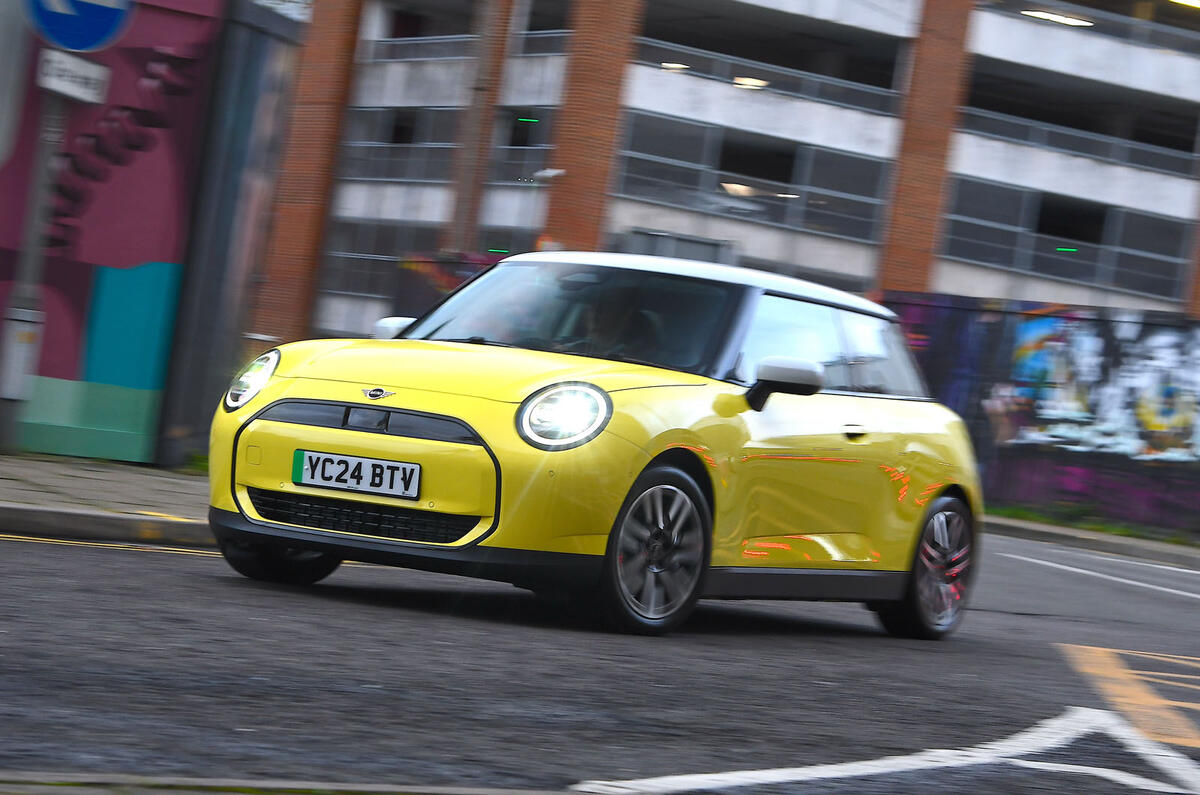Next-generation electric Minis could switch from the firm's customary front-wheel-drive set-up to rear-drive, due to the adoption of a new BMW Group platform.
The new Gen6 800V architecture, developed by Mini's parent firm, is claimed to be a “huge leap forward” compared with the technology offered in current-generation EVs. The claimed advances include an increase in range and charging speeds, as well as a reduction in the cost of making cars.
Starting in September with the next-generation BMW iX3 – which will draw heavily on the Vision Neue Klasse SUV concept – the new Gen6 tech will be rolled out across all BMW, Rolls-Royce and Mini EVs from their respective next-generation models.
The current Cooper and Aceman are front-driven but use a bespoke architecture developed in partnership with China's Great Wall Motor. BMW has yet to disclose a date for the next-generation cars, which are set to swap onto the Neue Klasse platform.
But its adoption could mark a significant change for Mini, which in the spirit of the 1960s original has always focused on a front-wheel-drive set-up. The configurability of the new platform means single-motor cars can only be had with the powertrain on the rear axle. This is because the main electrically excited synchronous motor (EESM) is the only one offered by the BMW Group with an integrated gearbox, and this sits exclusively between the rear wheels.
BMW Group engineers told Autocar at the launch of the platform that there are currently no plans to develop an EESM for use on the front axle and only the new small asynchronous motor (ASM) – which doesn’t house a gearbox – will be fitted at the front. BMW models have long been developed with a rear-drive focus.
One reason for this decision is because a rear-wheel-drive set-up is “better for dynamics”. As such, the platform can support only rear- and all-wheel-drive set-ups in single-, dual-, tri- and quad-motor configurations.
When asked if this meant the end of front-wheel-drive electric Minis in the future, purchasing and supply board member Joachim Post would not directly confirm it. Instead, he said: “We will see what the future is.”
Post added that the brand's future models will “always have Mininess”. He questioned “what is the best, the optimum for the package?” and added: “We want to make one thing feasible: sheer driving pleasure.”
Any changes are still a long way off, given Mini’s entire line-up – which includes the new Cooper, Aceman and Countryman – has been completely refreshed during the past 18 months.









Join the debate
Add your comment
This is probably a good idea. I think BMW have extended their retro reimagination of the Mini too far and the Cooper hatch needs a complete reinvention. As BMW told us when they switched to fwd for the 1 Series, their drivers are not interested in which wheels the powertrain drives and I'm sure it is not beyond BMW's engineering prowess to give a rwd Mini a Go Kart feel. Furthermore a fundamental redesign would provide the opportunity to embue a new model with the compact space efficient characteristics of the BMC original. I actually like distinctive design but you have only to compare the heavy, bloated J01 Mini with the new Renault R5 to see how BMW have completely lost the plot. It seems that BMW have at last woken up to the need with the Neue Klasse models to go back to their best days so hopefully they will apply some radical thinking when it comes to the next generation Cooper - and while they are at it do away with the completely minimalist dashboard and improve the interior quality to make it the premium car that buyers expect from a premium brand.
BMW took a great design from Rover and have progressively turned it into more and more of a dog.
That may be your point of view, which is perfectly valid, but I know several long-term Mini drivers who were so happy with their new Minis that I borrowed one (Electric Cooper S 2-door hatch) and f0runf it such a delightful car to drive that I bought one and am thoroughly happy with it.Coming most recently from BMW and Porsche 911s, I I knew this would be a very different driving experience, but I didnt expect it to be such a fun, amusing and practical one.It's a genuine joy for anything but long journeys, where the range is ultimately the limiting factor, though only if you're in a genuine rush to get to the end of the journey.